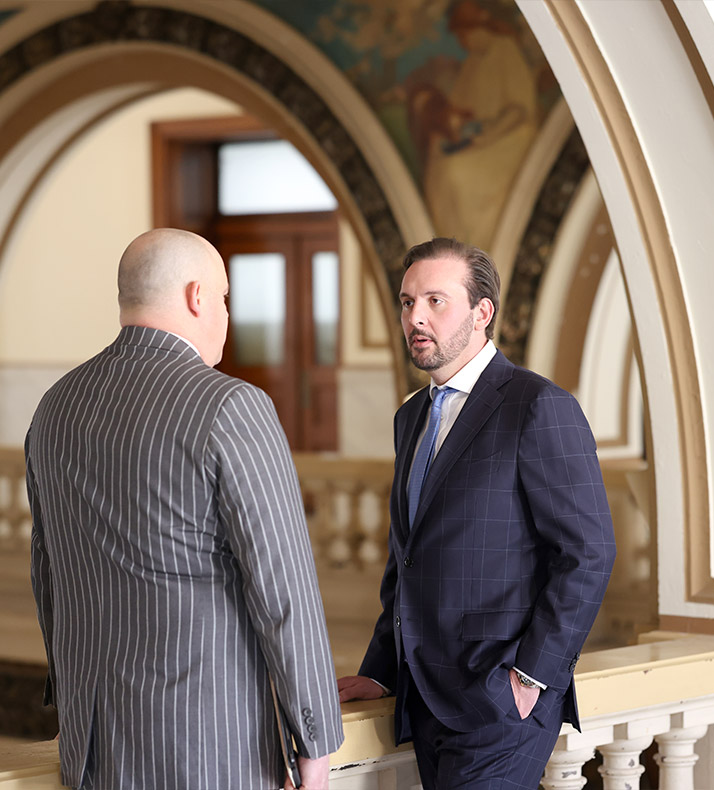Additional Links
- Criminal Lawyers With Payment Plans
- Missouri Revised Statutes
- Missouri Criminal Defense Resources
- Legal Books
- Defending Freedom Podcast
- Legal Videos
- Can Police Search My Phone?
- Top Reasons You Need a Criminal Defense Lawyer
- Probable Cause: Police Searches and the 4th Amendment
- Dos and Don’ts when Interacting with the Police

What Are Internet Crimes in Missouri?
Missouri has several criminal statutes that cover internet-based offenses. For example, Missouri prohibits hacking, denial-of-service attacks, and other cybercrimes.
Other offenses fall within the scope of the state’s conventional criminal laws. For example, fraud is illegal whether the perpetrator commits it online or offline. These crimes usually have the same elements regardless of how they occur. However, prosecutors may use different evidence, such as forensic computer data, to prove online crimes.
We handle cases like your every day. Reach out to our St. Louis internet crimes lawyers now at (314) 900-HELP.

Missouri Statutes Covering Internet Crimes
The Missouri Revised Statutes do not have a chapter for internet crimes. Instead, these crimes are spread throughout the criminal code based on the type of offense. Some appear in the chapter on robbery and stealing, while others fall under sexual crimes.
Internet crimes in Missouri include the following offenses:
Fraud and Theft
Stealing can occur online or offline. Theft happens when a person takes the property or services of another without their consent or through deceit or coercion. The law has no special section for online fraud. Instead, it falls under the same statute as other types of theft and fraud.
Property includes anything of value, including intangible property. Thus, software, game currency, or other online property can be stolen just as money or credit card numbers can be stolen.
If you’ve been charged with theft of online property, prosecutors may work to prove you took the property without permission or deceived or coerced the owner into giving it to you. Taking property without permission online often involves unlawful access. For example, logging into someone else’s bank account and transferring money to your account could constitute stealing if you do not have permission.
Deception involves lying to the owner. For instance, a phishing email that tricks someone into giving you their bank login and password might qualify as stealing. Coercion involves a threat to do any of the following:
- Accuse the victims or someone else of a crime
- Expose any person to hatred, contempt, or ridicule
- Harm the victim’s credit or business reputation
Another example of an online crime in Missouri is to trick the victim into sending compromising photos or messages online, then blackmailing them by threatening to post the information online.
Child Pornography
Online communities have significantly expanded the availability and access to child pornography. Missouri has three primary offenses that cover these photos and videos.
Sexual exploitation of a minor occurs when someone knowingly or recklessly creates obscene material involving a minor or child pornography. Promoting child pornography happens when someone knowingly possesses child pornography with the intent to promote it to others. “Promoting” includes making, selling, distributing, and exhibiting.
Additionally, possession of child pornography occurs when someone knowingly possesses child pornography. This charge is available if prosecutors cannot prove the accused’s intent to distribute the material.
Sexual Misconduct
Sexual misconduct covers a few different offenses. Sexual misconduct with a child occurs when a person exposes their genitalia to a minor or coerces the minor into exposing their body to the person. This crime can happen online or offline.
Non-consensual dissemination of sexual images, commonly called revenge porn, occurs when someone disseminates or threatens to disseminate images known to be private that show an identifiable victim while nude or engaged in a sexual act.
Enticement of a child happens when someone persuades or solicits a child under 15 using an electronic device to engage in sexual conduct.
Cyberattacks and Tampering
Missouri has three statutes designed to protect victims from hacking, viruses, and other cyberattacks. The crime of tampering includes the following offenses:
- Modifying or destroying data or software on a network
- Disclosing or taking data, software, or documentation on a network
- Disclosing or taking a password, code, or PIN for accessing a network
- Accessing a computer network and intentionally viewing someone else’s information
- Receiving, retaining, or using illegally obtained data
- Accessing a network without authorization
- Causing someone else’s network to deny services to an authorized user
- Modifying, destroying, or damaging computer network equipment
These offenses can occur through the internet or in person. For example, the prosecution might accuse you of taking a former employer’s data by stealing a hard drive or hacking into their network.
Possible Defenses for Internet Crimes in St. Louis, MO
Defenses for internet crimes can be complicated. In many situations, the critical issue in your case might involve the government’s expert witness testifying about forensic computer data favorable to the prosecution and a defense expert countering the testimony.
Importantly, one defense with limited use in certain prosecutions is a mistake. Specifically, you cannot raise a defense of a mistake about the child’s age in a child pornography case. This means that if the person reasonably appears to be a minor in the images or videos, you can be prosecuted regardless of what you believed.
Some possible defense strategies that an attorney may raise in an internet crimes prosecution include the following:
Alibi and Mistaken Identity
While forensic evidence might pinpoint the computer network or computer used to commit an internet crime, it often cannot identify the user. Thus, one possible defense is that your computer was accessible to multiple people, and prosecutors cannot identify whether you were the person responsible for the alleged crime.
Additionally, you might have an alibi for certain alleged crimes. If the prosecutors allege that a crime occurred on a certain day and time, your attorney can present evidence, such as eyewitnesses or photos, proving that you were not at your computer.
In some cases, you might even be framed by someone else. Computer hackers can mimic IP addresses to create a false forensic trail. You might face charges for a crime that did not even occur on your computer. An expert witness can help your attorney raise questions about the prosecution’s forensic evidence.
Consent
Consent might be a defense to certain stealing or tampering charges. You are allowed to take property when the owner consents. For example, you can use your boss’s password to access a network if they give it to you. Similarly, you can use a friend’s PIN to transfer money from their account to your account if they consent.
However, consent is not a defense for child pornography charges. Minors do not have the legal capacity to consent to the filming, manufacturing, or distributing of pornographic images.
No Intent
To obtain a conviction, prosecutors must prove your knowledge. If you did not know what you were doing or its consequences, they might not be able to prove intent.
For example, suppose that you forwarded an email that, unbeknownst to you, had a virus attached. You can likely avoid tampering charges in this scenario.































